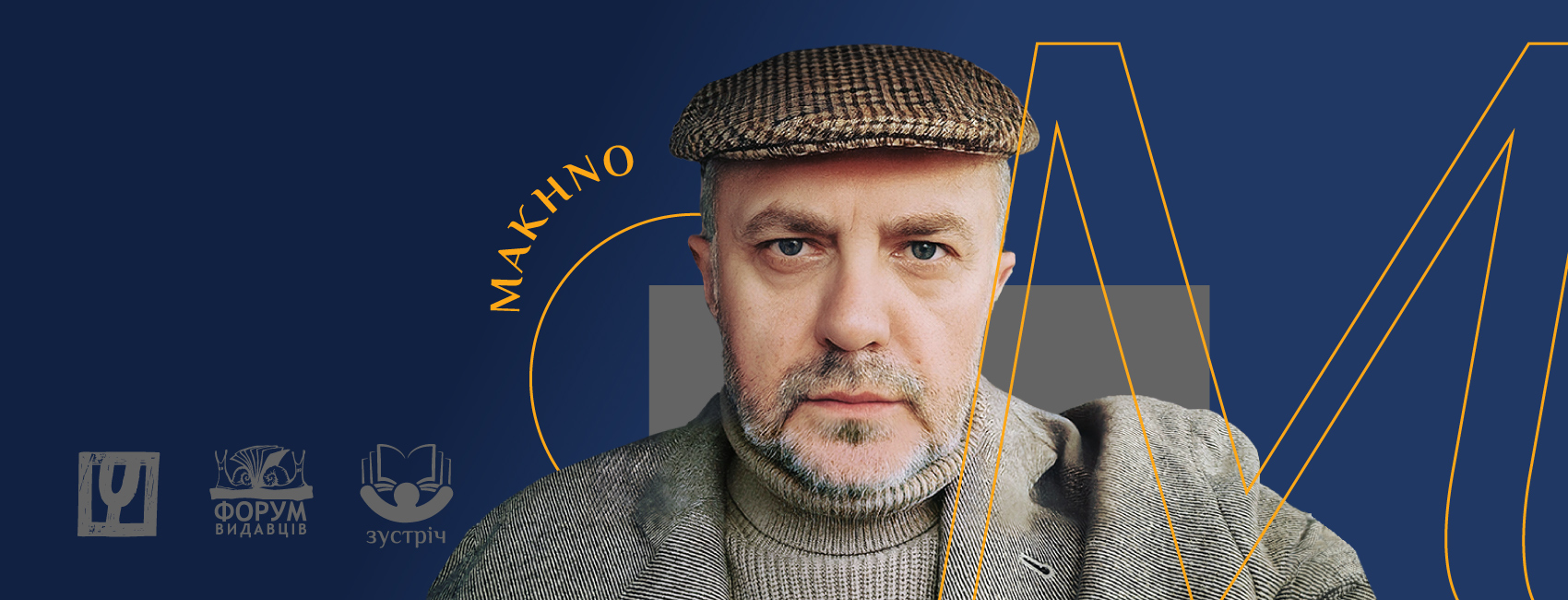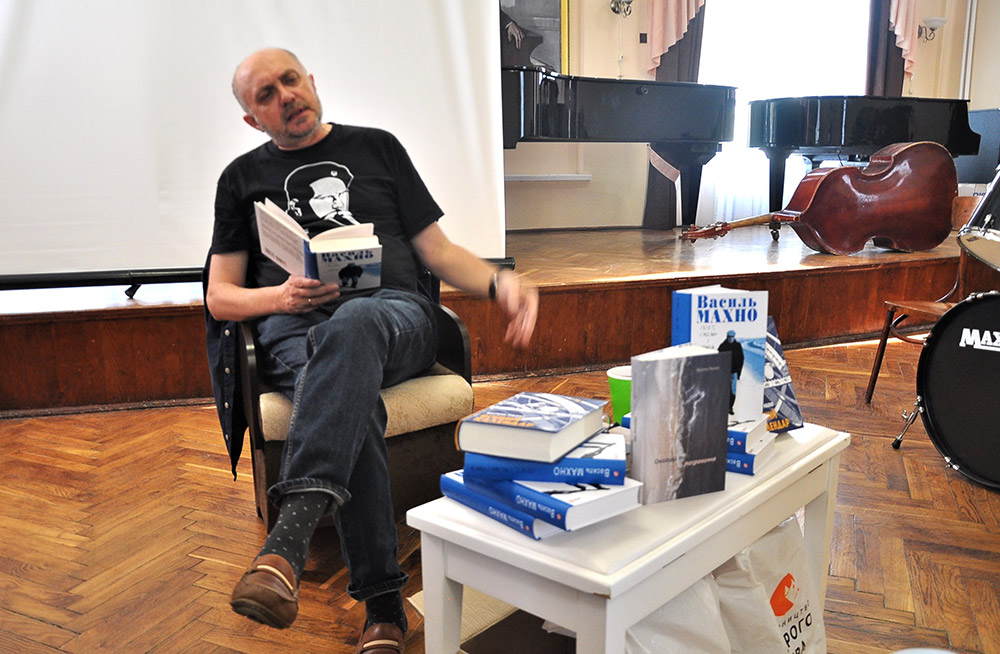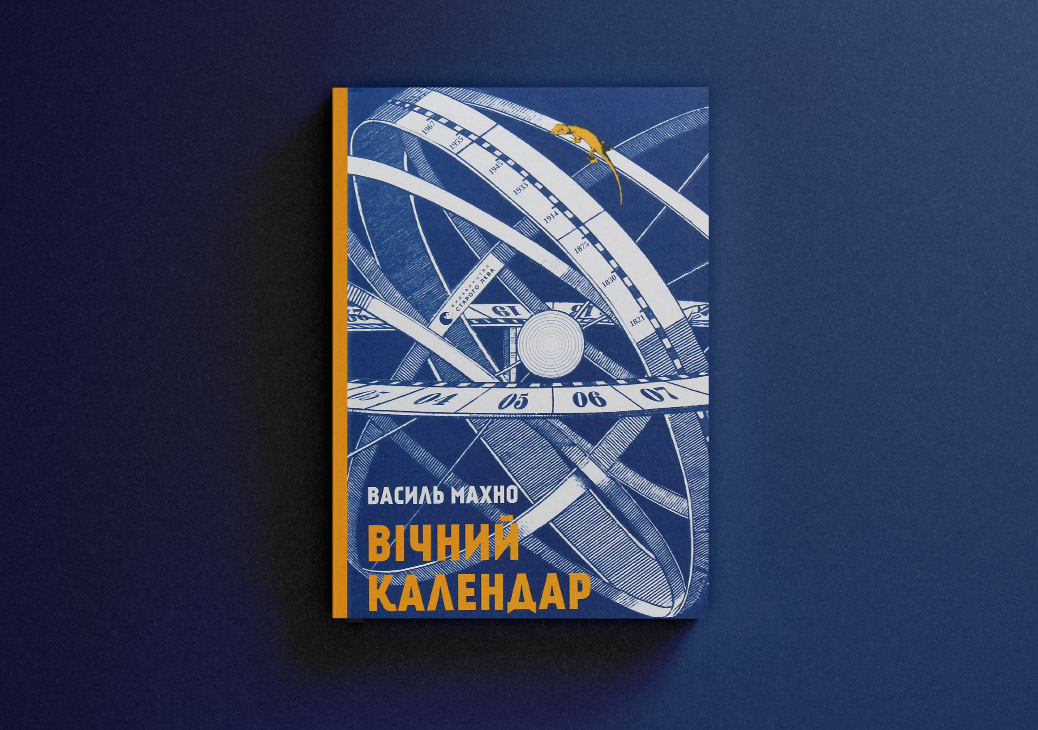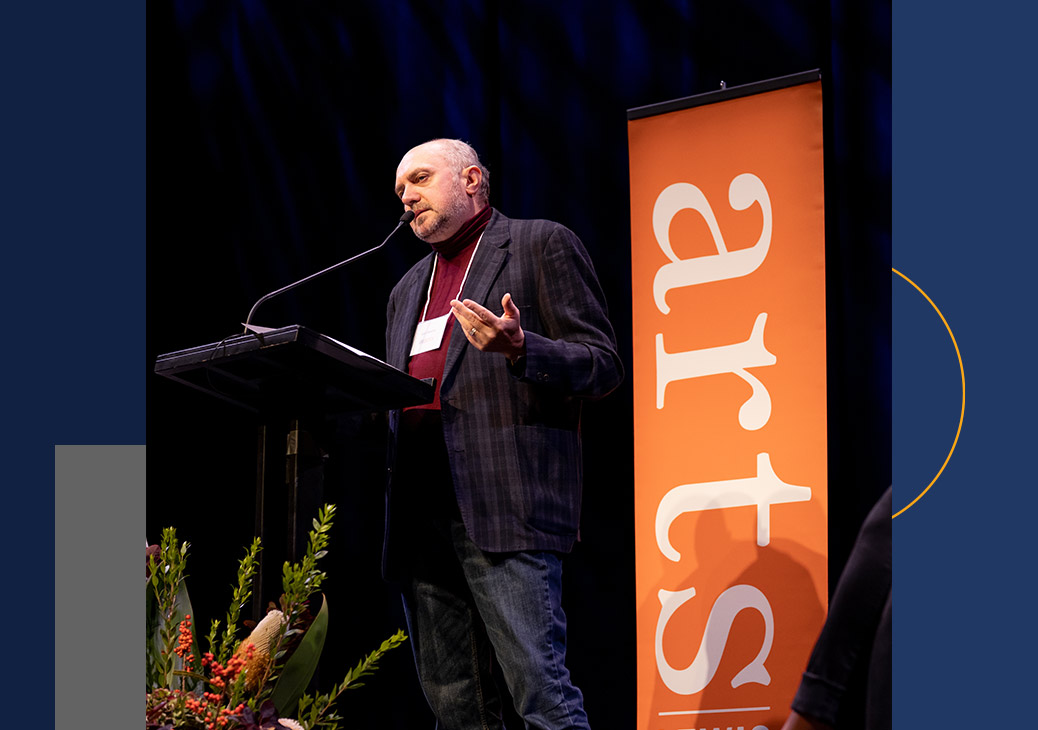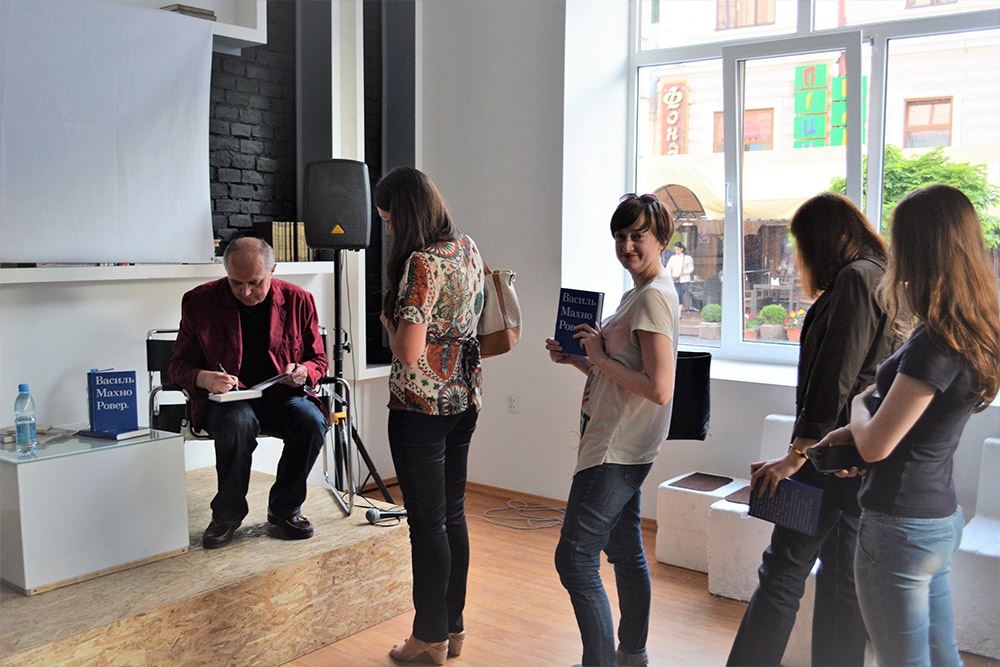Vasyl Makhno speaks about Ukraine as a space of cultural coexistence
The writer Vasyl Makhno has been living in the USA for nearly 25 years but has never lost touch with the Ukrainian cultural context. He writes and works in New York, but his books are regularly published by Ukrainian publishing houses, and the author himself participates in Ukrainian literary festivals and wins Ukrainian prizes. In 2019, his novel The Eternal Calendar, set in the Western Ukrainian city of Chortkiv in different historical periods, won the Encounter: The Ukrainian-Jewish Literary Prize from UJE.
- Vasyl Makhno: for me, words have always had a sacred dimension;
- Vasyl Makhno on writing as a way to overcome the barriers of culture and time;
- Vasyl Makhno on Ukraine as a space of cultural coexistence;
- Vasyl Makhno on writing, time, interethnic understanding, and Ukrainian-Jewish relations,
Makhno is writing a new novel (already at 700,000 characters and counting), which will also touch on Ukrainian-Jewish relations, and the Old Lion Publishing House is preparing the first volume of his selected works for publication. Against his background, we talk about his creative method, the meaning of the literary form, and the coexistence of Ukrainians and Jews in the same geographical and cultural space.
Let's start with Chortkiv. It is your birthplace and the central location of The Eternal Calendar. What kind of environment did it offer from the viewpoint of experience? What impact did it have on your formation and outlook?
I was born in Chortkiv but grew up in a village 30 kilometers away. My grandfather and grandmother raised me since my parents divorced when I was five. I visited Chortkiv thousands of times during my life, both in childhood and adulthood. Otherwise, I consider it my hometown. I know it well and am well familiar with its history. I think that growing up in the countryside, I was actually in the same atmosphere as Chortkiv had. It was the atmosphere of Galicia, partly patriarchal and partly Soviet.
As a child, I met people who fought in the First World War or were teenagers at the time, as well as those who lived in the 1920s and 1930s in the Polish interwar state and later directly or indirectly participated in the Second World War. They witnessed the post-war confrontation between the Ukrainian underground and the Soviet authorities... So, there was a broad spectrum of historical shades that became superimposed on one another with time. As an adult, I later learned that our region had also been part of the Ottoman Empire for over two decades. It was a fascinating discovery, as I remember from childhood that some of my fellow villagers had absolutely oriental anthropological traits.
I would say that the influence of place, time, circumstances, and people is very important. In my case, the Chortkiv element had a tremendous effect.
Chortkiv has an ancient Jewish community, just like Buchach, a Western Ukrainian town that hosts the Agnon Literary Residence. These are typical cases in our history as Ukrainian cities and towns have been places of intercultural and interethnic interaction for centuries, including between Ukrainians and Jews. It is very hard to imagine an urban space without the Jews, especially from the historical perspective. However, we rarely see the Ukrainian element highlighted in the literary works written by Jewish authors in Ukraine. This creates the impression that the ethnic communities of Ukrainian cities and towns were somewhat separate or even isolated, at least culturally, and the interaction between them was limited to everyday affairs. Is this a misleading impression?
On the one hand, I would say that these urban Ukrainian-Jewish relations are characteristic of the frontier. If various communities live there, this is a frontier — cultural, linguistic, religious, etc. Naturally, this is not easy, and such coexistence has its own nuances. I also often visited Buchach as a child and later as an adult. I remember the first impression several of Shmuel Agnon's novels made on me. The idea that those were closed societies, especially the Jewish one, is accurate but perhaps only on the level of religion and maybe culture. But life is multifaceted, right? There were marketplaces, tailors, blacksmiths, and people of various other trades. Ukrainian peasants brought produce to the market. A lot of communication occurred on this level. And these levels were open.
However, let's look at, for example, Karl Emil Franzos, a 19th-century Austrian writer. He was born in Chortkiv and wrote what would now be classified as essays, particularly about Chortkiv, describing it during one of the market days. Franzos was a secular Jew, a Jew of German culture, and he was open to dialogue. In contrast, Agnon was an orthodox Jew attached to writing, the Torah, and the Talmud. Jewishness was the highest rank for him, and Judaism was the beginning of all beginnings. He did not see the Ukrainian, Polish, or Austrian Buchach. However, he had this, so to say, literary-nostalgic desire to portray Buchach as a multicultural town closer to the end of his life. Nonetheless, he was totally different from Franzos, Joseph Roth, and other Jewish authors who wrote in Hebrew, Yiddish, Polish, or German and nurtured this multiculturalism in their works, wanting to talk about it.
We see two ways of understanding this Galician space in literature. On the one hand, this issue is complex and personal, while on the other, it reveals trends in interaction.
Regarding the partial isolation of the Ukrainian and Jewish communities in the same space, I think about individuals who tried to overcome these barriers but also recall the reasons for this status quo. This chain of thought inevitably leads to the problem of a people having no state of their own, which is something both Ukrainians and Jews experienced. Culture primarily focuses on self-preservation in this situation, while building international relations becomes a peripheral task. This protective mechanism continues to operate but is no longer as important as before because both Ukrainians and Jews have their own states. Today, we have UJE's Encounter Literary Prize, the Agnon Literary Residence, and many other initiatives, but can we already see the steady strengthening of intercultural interaction between our peoples? Do you feel we are making progress along this line?
One can compare Ukrainians and Jews as peoples that had existed without a state of their own, which forced them to build such a hermetic social and cultural environment. However, the similarity is superficial. After the destruction of the Second Temple, the Jews were forced to leave their lands and scattered throughout the world. Ukrainians did not become so widely dispersed. I once came up with this phrase about the Polish state: Ukrainians lived on their land, Poles lived in their state, while Jews lived in their books. This formula seems to be relevant to your question.
Of course, there are some similarities, but we still differ in various cultural aspects. Many Ukrainians know that we did not live in our territory alone and that various historical events swept across Ukraine. Why does this concern us? Our generations have experienced a lot, and we have a sense of responsibility. When we talk about the context of Ukrainian-Jewish relations, this responsibility — in the form of awareness — affects, above all, intellectuals and authors who start developing these topics.
Some Jews consciously chose the Ukrainian language and became Ukrainian artists. Those were isolated cases, but they were an indicator that certain attitudes and prejudices towards Ukrainians were undergoing re-evaluation in the Jewish community. This cultural part of both ethnic groups, both nations, tries to get through and cooperate.
Religious tolerance and the awareness, particularly among Ukrainian believers, that Christianity came from Judaism are equally important. We recognize the Old Testament, which is an important book for Jews. This awareness should also play a unifying role in communication and understanding. However, it is easy to see that during the independence years, the dominant paradigm in the Ukrainian cultural environment shifted from mistrust and non-acceptance to cooperation and understanding of certain things. This is a significant and positive impulse, which we need to comprehend all the tragedies of our history, including the tragedy of the current situation.
You mentioned the image of Jewish culture, which is preserved in books, in your novel The Eternal Calendar. You wrote about the ancient Jewish families of Chortkiv, which are no longer present in the urban environment but live on in texts. The focus here is undoubtedly on individual human lives. When talking about history, it is very easy to make generalizations. However, when it comes to specific families and people, we can feel more empathy for the era and the communities going through all the historical perturbations. It is a movement from the big picture to the details. There are a lot of details in your work at the stylistic level. For example, many particulars are strung together into long lines in your poems, and The Eternal Calendar contains detailed descriptions of material culture, especially at the beginning. How important is this kind of detailed description for you? What is its real function?
This is a fascinating and multifaceted question. As a second-year philology student, I wrote a term paper on artistic details in Hryhir Tiutiunnyk's novels, so my interest in detailed descriptions of the world is very old. A detail speaks volumes if used correctly and skillfully. To write the first part of The Eternal Calendar, which refers to the Ottoman period, I had to read a lot of different historical literature in many languages, even though it was not a historical novel that I was working on. I had to go to Istanbul and Jerusalem. But I understand, as well as any of us, that if modern literature models some ancient or even modern ones, it doesn't offer a copy. There is an element of fiction in the details, the epoch, the events, and the imaginary historical characters. Was it really so or not? Did the Ottoman sultan say these words, or did he not? This is for the writer to decide, so to speak. But we begin to understand this world when the details are joined into the framework of the text and do not fall apart.
I put the rhyming principle into the foundation of The Eternal Calendar: Sabbatai Zevi (a rabbi and leader of the Jewish messianic movement in the 17th century) is mentioned in the first part, and he does not disappear in the second and third parts. He was a messianic pretender and played a historical role not only in the Jewish community but also across Europe. And this figure does not disappear anywhere in the text with time.
You can write more and accumulate more things in a novel, whereas a short story requires that the language be parsimonious, balanced, and extremely specific. Nevertheless, any work of art is a fragment, a detail, or some part of our imagined reality. When these details converge into something holistic and evoke the intended emotional and aesthetic reaction, it is an indicator that they are used correctly.
Is placing historical figures in different eras a way to describe some kind of nonlinear time or working with memory? Can it be said that different eras coexist in time and are determined, for example, by how the surrounding space is constructed and how knowledge about ancient times is retained in memory? It seems that the space-time of The Eternal Calendar has a spiral dimension where everything exists at once, even though time unfolds linearly in the novel.
I wanted it to be timeless like that. Indeed, there is linear time, but it is also "cut" in a certain sense. This wavelike twisting creates, I think, a peculiar dynamic in the novel.
The flow of local time, the events occurring in it, and the way global time is represented were important aspects for me. Something happens in the world at one point in time, and it may somehow affect, say, Chortkiv. How do all these things interact? This variability also implies that you and I are in three times simultaneously. This is very important for a novel or prose in general, especially when it comes to the construction of nonlinear narrative frameworks.
Individual memory can remember different things, but it cannot be objective. Meanwhile, objective memory is a historical segment, time, and events that took place in it. And we balance all our lives between these Scylla and Charybdis.
The same thing happens when writing, but nothing can create a text if individual experience is missing. You can read thousands of books and know how to write novels or short stories, but if you have never tried to write such a thing, it will remain imaginary or unattainable.
You've said that your novel cannot be called historical and that it is a chronotope construed by the author, while still based on reality. You resort to a modified form of reality to convey ideas through it. What is the added value of the artistic word in this case?
What is fiction? It's information. Information is presented in a certain form, in a special language called poetics. We receive information every day from the mass media line by line. Fiction is completely different from mass media and not designed to spoon-feed information or deliver very fast, impulsive messages. Fiction has a much deeper task. Whether it takes the form of poetry, essays, or longer prose, fiction talks to the reader in a different language. You need to be prepared for this language, especially in poetry. Poetry is, so to speak, a condensed artistic language that contains many different things we do not encounter on a daily basis. We do not speak using such words. In a way, it is an artificial form of human speech.
Looking at the history of literature, we will see that it has been informative since ancient times in chronicles, annals, etc. Other ways of informing did not exist. Now they do. It's easier to open Facebook or some website and read something there. Reading and understanding a long novel or a short poem is more difficult. It requires a different type of communication. We're reaching the point where the mass media dominate, while fiction doesn't feel quite comfortable in this space. Everyone complains that young people stop reading as they get used to consuming short texts, and this reality of anti-reading or simplified reading affects fiction. In any case, we are dealing with words, and for me, words have always had a sacred dimension in that the author has a special relationship with the written word.
I remember the title of your story, "Polish Bicycle, Russian Frame," from the collection The House in Baiting Hollow as a kind of metaphor or image of how Poles and Ukrainians coexist in the same space. I am always tempted to paraphrase it, for example, as "European bicycle, Jewish frame," superimposing it on the territory of what we like to call, probably following Kundera, Central or Central-Eastern Europe. I also think about Family Europe, a concept proposed by Czesław Miłosz. Looking at this structure, I understand that the Jewish frame cannot be removed from it. The impression is that Jewish culture is, to a large extent, what defines this territory, providing it with common points of contact. It is always about certain shared experiences and traumas and stories of interaction. Can the Jewish topic be the narrative through which Europeans will draw closer to each other?
I think so. In general, the term Central Europe is an invention of intellectuals who wanted to somehow separate themselves from Western Europe on the one hand and Eastern Europe on the other. It's like a bridge between Western Europe and us, through which we also consider ourselves part of Europe.
Indeed, looking at the map, we see that Jews have settled throughout Europe from the Middle Ages to the present day. Of course, the culture of German Jews was different from that of Polish Jews, just like there were differences between Spanish and Italian Jews. However, their unifying factor was religion and then culture, which grew in modern times and involved not only in literature but also philosophy, psychoanalysis, and other things we know about.
I will tell you more. Being here in New York, I sometimes have the opportunity to meet German readers. Groups of people come here looking for a Jewish, Polish, and Ukrainian New York. I catch myself thinking that average Germans know very little about Ukraine. I tell them: "Listen, Berlin is a thousand kilometers from us [Ukraine], maybe more, but we are not Asia, which is five thousand kilometers away. We are part of this European melting pot." And I realize that a thousand kilometers is such a long distance. Why? Because everything they see in the East is linked to Asia in their perception. It's something distant, not their own, maybe not worth paying attention to, and not emphasized in their literature and media. I am not talking about the latest events of the Russian-Ukrainian war. At least, I know more about German history, philosophers, and writers than they do about Ukraine. And here we come to the key question: What is Europe really? There is a colossal difference between us, colossal discrepancies. Perhaps literature and these components of multiculturalism and frontier can somehow make up for it and weave threads that will hold the fabric of the European community together.
Interviewed by Oleksandr Mymruk.
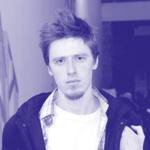 Oleksandr Mymruk
Oleksandr Mymruk
Journalist, cultural critic, writer. Author of the poetry collection Tsukrovyk (Smoloskyp Publishers, 2017) and the nonfiction book Oleg Sentsov (Folio Publishers, 2017). Winner of the Smoloskyp Literary Prize and the Clay Cat Prize for the best poetic debut of 2017-2018. Winner of UrbaPerekhrestia, Haivoronnia, and a number of other literary contests.
Mymruk has been the editor of the electronic publication Independent News Bureau since 2016 and of the Chytomo cultural publishing project. He has contributed articles on urban planning and architecture to Espresso TV and founded the project "Constructivism in Kyiv" to popularize and systematize knowledge about Kyiv's interwar avant-garde architecture. In 2018, he helped conduct the Ukrainian Reading Publishing Data 2018 survey supported by the Ukrainian Cultural Foundation. In 2018–2019, as a representative of Chytomo, Mymruk provided information support for the Ukrainian delegation at the Frankfurt Book Fair. He is the head of NGO "Chytomo" since 2019.
This material is part of a special project supported by Encounter: The Ukrainian-Jewish Literary Prize. The prize is sponsored by the Ukrainian Jewish Encounter (UJE), a Canadian charitable non-profit organization, with the support of the NGO "Publishers Forum." UJE was founded in 2008 to strengthen and deepen relations between Ukrainians and Jews.
Originally appeared in Ukrainian @Chytomo
Translated from the Ukrainian by Vasyl Starko.







